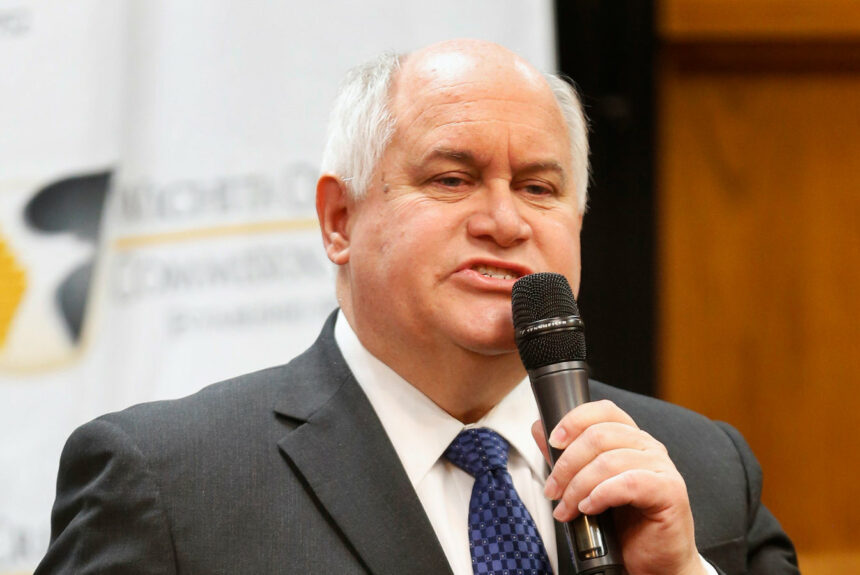Over the past few years, the GOP has changed its stance on energy, climate, and environmental issues, becoming the party of innovation and “all of the above” solutions. One of the thought leaders driving this shift is Representative Ron Estes, who represents the 4th congressional district in Kansas. Estes recently joined John Hart on Right Voices to discuss using free market policies to address energy and environmental issues.
As Rep. Estes describes it, Kansas’ 4th district is a “cosmopolitan breakdown of America,” due to its diverse economic makeup. At the heart of the district is Wichita, home to several aviation companies and dubbed the “air capital of the world.” Every Boeing 737 fuselage is built here before it is shipped off to Seattle to be assembled. In addition to this, agriculture and energy production (both traditional and renewable) are abundant in the area.
>>>READ: Rep. Pete Stauber Discusses the Need for Permitting Reform to Boost Domestic Mining
This economic diversity makes the region a good litmus test for American attitudes toward energy and environmental issues. As Rep. Estes can attest, a majority of Americans want policies that follow common sense. “The top-down narrative that’s tried to be crammed through, the people in Kansas just don’t connect to that,” said Estes. “They want to make sure that we keep the lights on, which means you need to have a base level of energy that supports that because the sun doesn’t shine at night and the wind isn’t always blowing so you can’t necessarily rely on the sustainable energy sources for all of your energy usage. So when I talk in the district people say ‘let’s make common sense solutions that are workable to help us move forward.’”
One such common sense solution that the House of Representatives recently passed is H.R.1, the Lower Energy Costs Act. This comprehensive bill includes several provisions that modernize permitting for all energy, infrastructure, and conservation projects and reduce barriers for domestic energy production. Also in H.R.1 is an amendment put forth by Rep. Estes that replenishes the strategic petroleum reserve, which the Biden administration has used as a political tool in an attempt to lower energy costs.
Importantly, H.R.1 prioritizes energy security by allowing the market, not government, to pick energy winners and losers. As Rep. Estes stated:
“We need to make sure that we are energy independent. Energy drives the economy. It drives so many things that we hold dear. Whether it’s the cell phones that we all talk on or going to school or the hospital and being cared for if you need that. So we need to make sure that we have smart policies going forward. I’m a big advocate of ‘all of the above.’ We need to conserve and be responsible in terms of our usage. We need to rely on our existing resources, which includes oil and gas as well as nuclear… and sustainable energy [like] wind and solar. And looking at future technologies, whether it’s smaller nuclear [power] and hydrogen.”
A state treasurer prior to being elected to Congress, Rep. Estes is also looking to drive energy innovation by reforming the tax code. Specifically, the Congressman is working with members on both sides of the aisle to make immediate expensing for research and development permanent in the tax code. Originally introduced in the 2017 Tax Cuts and Jobs Act (it has since expired), immediate expensing allows a company to fully deduct an R&D expense in the year that it occurred, rather than over time. This in turn leads to more private sector investment in research and development, which drives innovation and benefits the environment and economy alike. As Rep. Estes pointed out, “We all want research and development in the United States. As we look [for ways] to grow the U.S. economy, research and development leads to more manufacturing jobs, more opportunities for American workers.”
>>>READ: New Legislation Would Boost Innovation, Support American Competitiveness
Estes signaled that he was optimistic about the possibility of immediate expensing reform passing. In both the House and the Senate, bipartisan bills have been introduced to extend this tax provision and expand the R&D research credit.
As the summer rapidly approaches, bringing with it greater energy demand for transportation and cooling, Americans are in desperate need of energy relief. Common sense solutions like an “all of the above” approach and immediate expensing, which Congressman Estes has championed, can deliver such relief. As Congress addresses these issues, expect Rep. Estes to be an active leader in advancing such reforms.
The views and opinions expressed are those of the author’s and do not necessarily reflect the official policy or position of C3.
